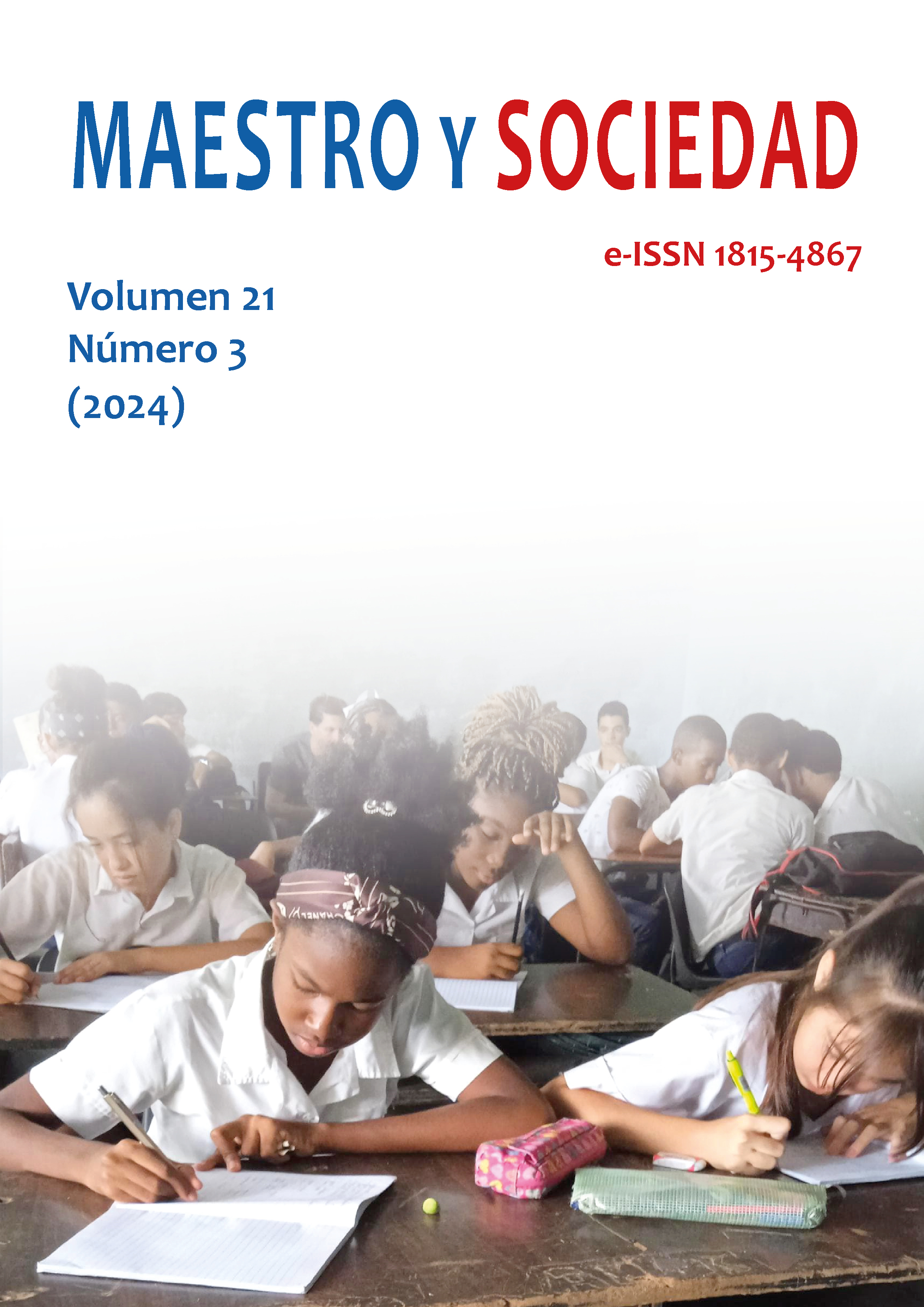LLECIA Method of learning by partial tests with the help of artificial intelligence in basic education teacher training
Keywords:
artificial intelligence, basic education, teacher trainingAbstract
Introduction: This study is based on a classroom research project, and addresses the generation of the LLECIA method with the support of artificial intelligence techniques in teacher training for basic education. The research focused on identifying the effectiveness of this combined methodology in the development of pedagogical skills and the improvement in the academic performance of the competencies resulting from working on the content of the subject with pedagogical models. Materials and methods: The methodology that is created is based on the application of partial essays, where learners receive constant and adaptive feedback during the learning process. Artificial intelligence is incorporated to personalize and optimize this feedback, adapting it to the specific needs of each student. This approach aims to encourage active and meaningful learning, promoting reflection and continuous improvement of learning in situated contexts. Results: The results obtained show a positive impact on teacher training, evidenced by a significant increase in the acquisition of pedagogical skills and better performance in argumentative activities that were the subject of a socio-formative evaluation process. Discussion: An increase in student motivation and engagement, as well as higher satisfaction with the learning process, was observed, suggesting a greater effectiveness of the AI-supported LLECIA method compared to traditional approaches. Conclusions: This study contributes to the advancement of pedagogical research in the field of teacher training and the integration of emerging technologies in education. It provides empirical evidence on the effectiveness of the AI-supported LLECIA method as a promising tool to improve the quality of learning in basic education.
References
Aguado, F. (2020). Buenas prácticas docentes en filosofía: aprender filosofía escribiendo filosofía en Investigación. I CIFED: Filosofía y Educación. Red Iberoamericana de Pedagogía–Redipe
Arroyo-Mantilla, M. V., & Carrión-Mieles, J. E. (2021). Estrategias de lectoescritura para el desarrollo de la escritura creativa. Polo del Conocimiento, 6(12), 468-483. https://polodelconocimiento.com/ojs/index.php/es/article/download/3378/7568
Ausubel, D. (1983). Teoría del aprendizaje significativo. Fascículos de CEIF, 1(1-10), 1-10.
Bain, K. (2006). ¿What the best collague teachers do? Harvard University Press.
Cervantes-Barraza, J. y Cabañas-Sánchez, M. (2022). Argumentación matemática basada en refutaciones. Journal of Research in Mathematics Education, 11(2), 159-179. https://doi.org/10.17583/redimat.4015
Díaz, D., y Latorre, J. (2021). Psicología médica. El servier.
Dussel, E. (2000). Ideologías políticas; ideologías; globalización; ciencias sociales; Europa, Consejo Latinoamericano de Ciencias Sociales (CLACSO), Buenos Aires.
Espinoza-Freire, E. E., Ordoñez-Ocampo, B. P., Ochoa-Romero, M. E., Erráez-Alvarado, J. L., & Lema-Ruíz, R. A. (2020). Alternativas metodológicas para la enseñanza de la historia. Conrado, 16(1), 194-202. https://conrado.ucf.edu.cu/index.php/conrado/article/view/1541
Gardner, H. (2006). La mente no escolarizada. Cómo piensan los niños y cómo deberían enseñar las escuelas. Paidós.
López, M., Huerta, J., Ibarra, J. y Almazán, K. (2014). Manual básico para la escritura de ensayos. Estudios y propuestas de lenguaje y educación Serie: Lenguaje, Educación e Innovación (LEI). México
ME (2023). Marco curricular competencial de aprendizajes Ministerio de Educación de Ecuador.
Perkins, D. (2006). La Escuela Inteligente. Del Adiestramiento de la Memoria a la Educación de la Mente. Gedisa.
Perkins, D. (2008). ¿Qué es la comprensión?, en: Stone Wiske, M. (Comp.). La Enseñanza para la Comprensión: vinculación entre la investigación y la práctica. Buenos Aires: Paidós, 69-92.
Perrone, V. (2008). ¿Por qué necesitamos una pedagogía de la comprensión?; en: Stone Wiske, M. (Comp.). La Enseñanza para la Comprensión: vinculación entre la investigación y la práctica. Buenos Aires: Paidós, 35-68
Quijano, A. (2011). Colonialidad del poder, eurocentrismo y América Latina. en Edgardo Lander, La colonialidad del saber. CICCUS/CLACSO.
Pisco, J. & Navarrete, Y. (2021). El fortalecimiento de la lectoescritura: una necesidad en estudiantes de Educación General Básica. Estudios del Desarrollo Social: Cuba y América Latina, 9(Especial No. 2). https://revistas.uh.cu/revflacso/article/download/3742/3279
Ríos-Cuesta, W. (2021). Argumentación en educación matemática: elementos para el diseño de estudios desde la revisión bibliográfica. Revista Amazonia Investiga, 10 (41), 96-105. https://doi.org/10.34069/AI/2021.41.05.9
Rumelhart, D. E. (1980). Schemata: The building blocks of cognition. En R. J. Spiro, B. C. Bruce, & W. F. Brewer (Eds.), Theoretical Issues in Reading Comprehension (pp. 38-58). Hillsdale, NJ: Lawrence Erlbaum Associates.
Silador, R. (2023). Manual de investigación, orientado a trabajos de titulación. Tecnológico Universitario Lezaeta.
Stone-Wiske, M. (2008). ¿Qué es la comprensión?, en: Stone Wiske, M. (comp.). La Enseñanza para la Comprensión: vinculación entre la investigación y la práctica. Paidós.
Tapia, E. V. (2019). Comunicación y redacción científica. Editorial Inblue. ISBN: 978-9942-789-11-2
Tapia-Sosa, E. V y Tapia-Ortiz, L.W. (2023). La práctica pedagógica decolonial para el desarrollo del pensamiento crítico. Editorial Inblue, DOI: 10.56168/ibl.ed.167884
Toulmin, S. (2007). Los usos de la argumentación (María Morrás y Victoria Pineda, Trs.). Barcelona, España: Ediciones Península.
Valbuena-Duarte, S., Cervantes-Barraza, J. y Herrera-Contreras, L. (2022). Patrones de argumentación colectiva en clase de matemáticas. Eco Matemático, 13(1), 6-17. https://doi.org/10.22463/17948231.3362
Valbuena, S., Muñiz, L., & Berrio, J. (2020). El rol del docente en la argumentación matemática de estudiantes para la resolución de problemas. Espacios, 41(9).
Vásquez, A. (2012). Nietzsche: de la voluntad de poder a la voluntad de ficción como postulado epistemológico. Universidad Central de Colombia.
Published
How to Cite
Issue
Section
License
Copyright (c) 2024 Ermel Viacheslav Tapia Sosa , Hugo David Tapia Sosa, Lenin Wladimir Tapia Ortiz, Alicia Magdalena Suárez Jijón

This work is licensed under a Creative Commons Attribution-NonCommercial-NoDerivatives 4.0 International License.
This journal provides immediate open access to its content, based on the principle that offering the public free access to research helps a greater global exchange of knowledge. Each author is responsible for the content of each of their articles.



























 Universidad de Oriente
Universidad de Oriente 